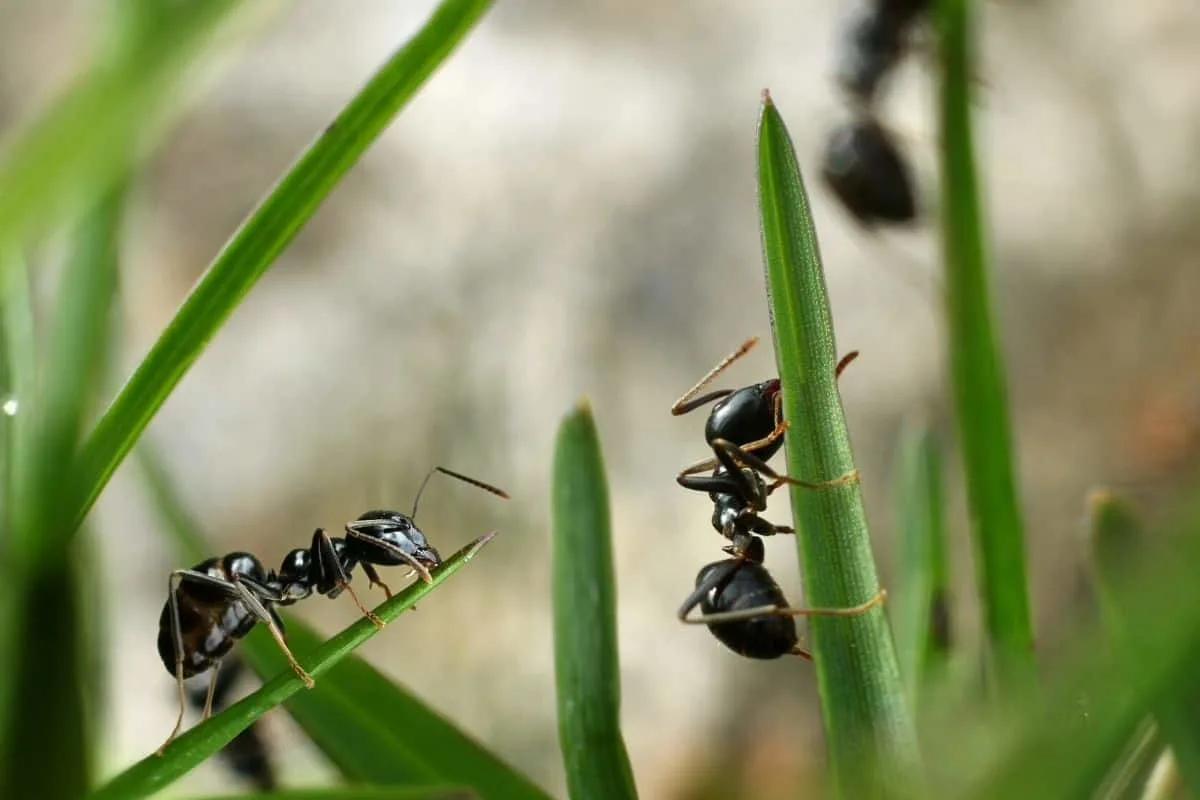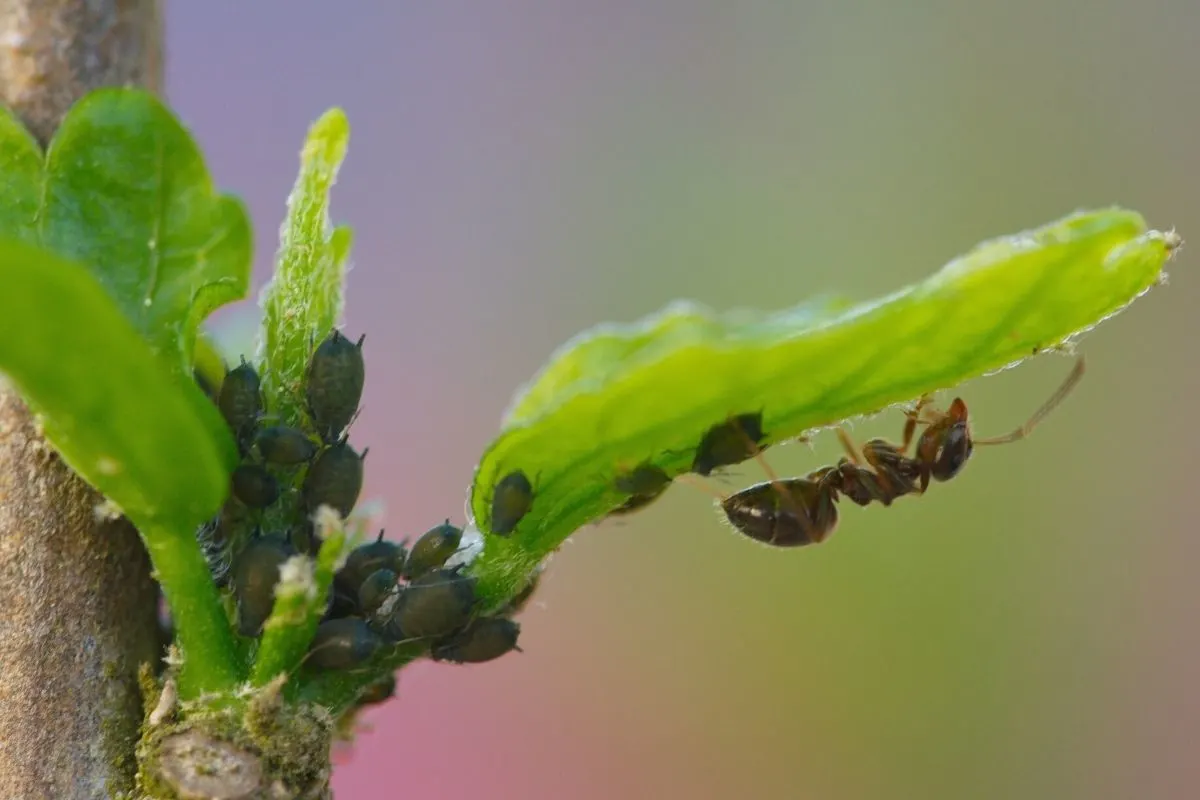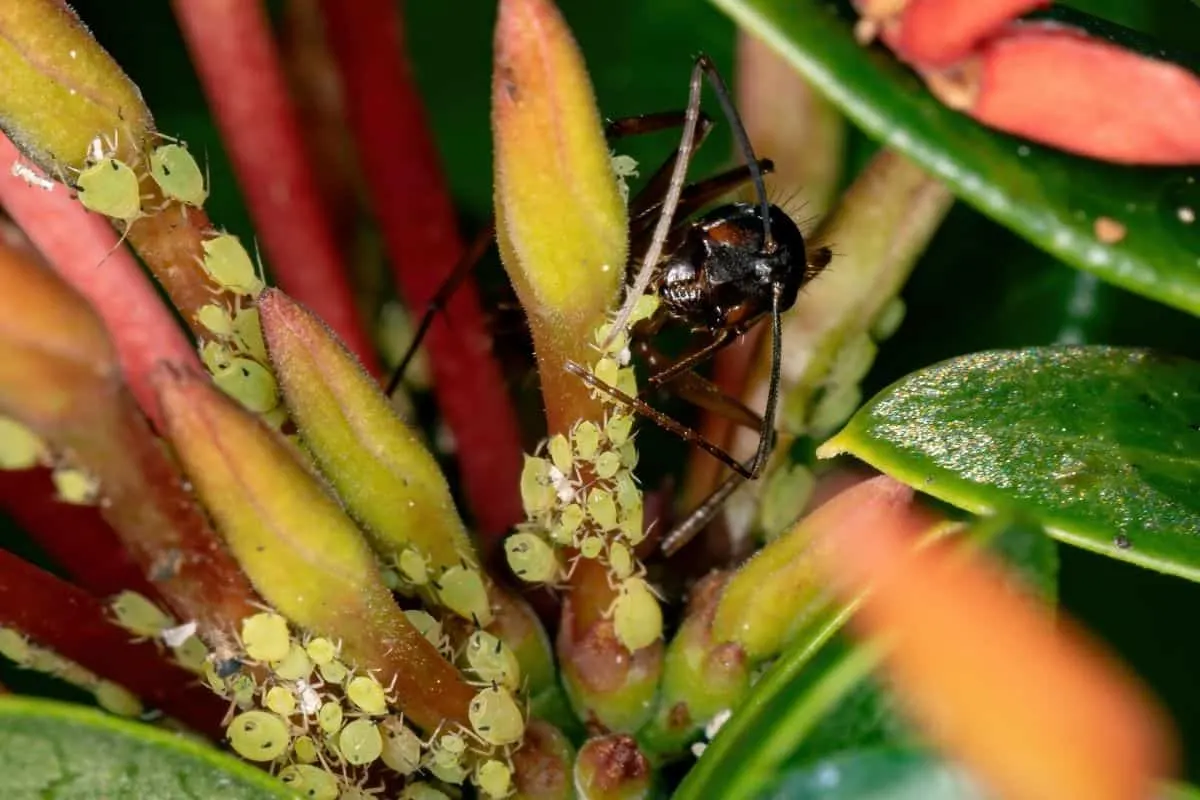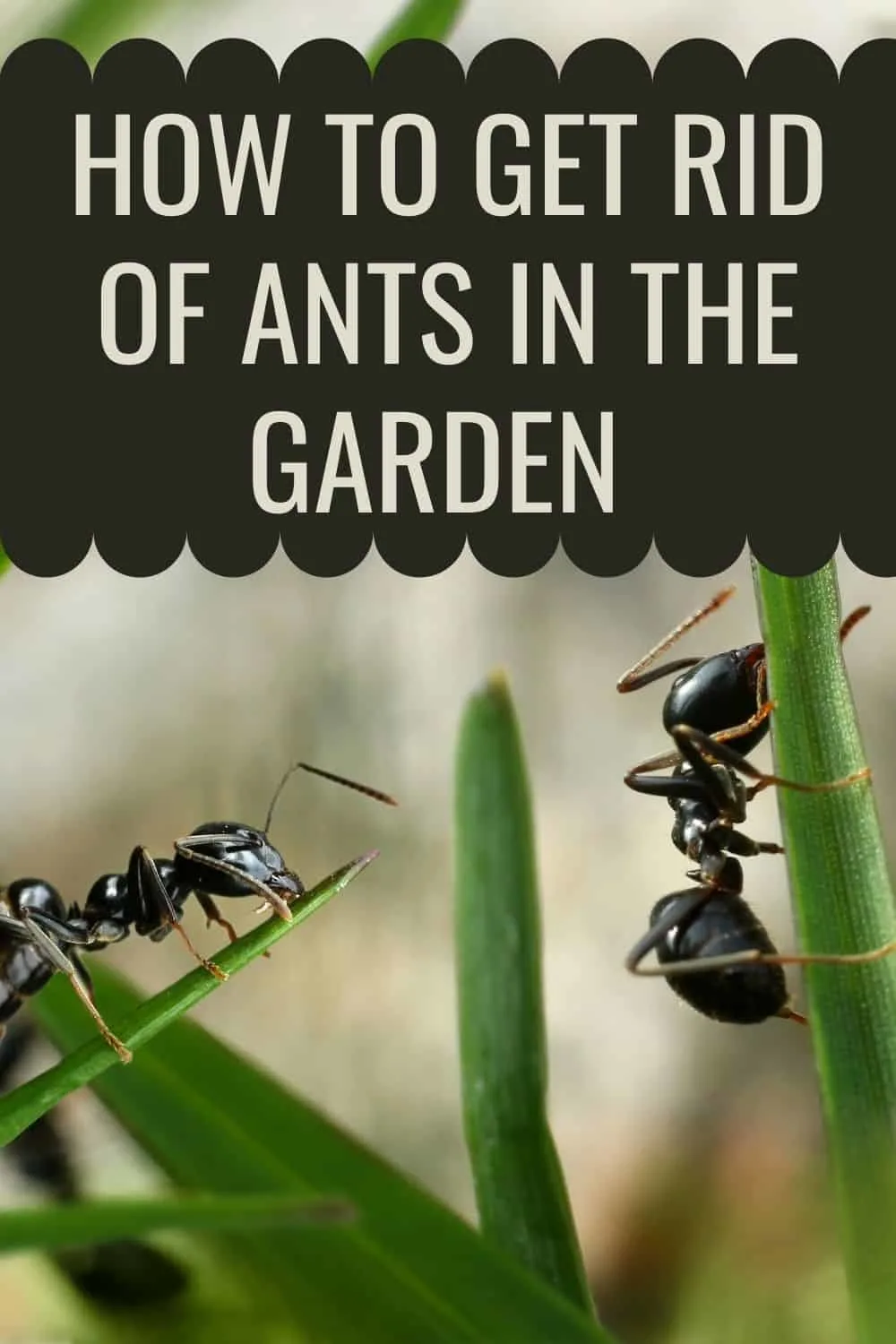Occasionally when working in my garden I will feel a tickle or the sting of an ant bite on my leg and look down to realize I’m standing on an ant nest swarming with tiny black specks. I’ve also noticed larger black ants congregating on the undersides of my sunflower leaves. But are they harmful? I want to know what they do and, if they cause harm, how to get rid of ants in the garden. Here’s what I have learned about ants.

It doesn’t feel good to get bitten by an ant but your ant problems can go further than that. When you first start to see those ant hills in your garden or lawn, what can you do about it? One of the first steps is to find out what species of ants you have. This will be key in how to get rid of them.
How to Get Rid of Ants in the Garden
It’s always helpful to properly identify a pest before taking action against it, as control methods often work for one animal and not another. From black ants to fire ants and everything in between, it’s essential to know what kind of ants you have. So before looking into ant control methods, let’s explore what ants and ant damage look like.
How to identify ants
There are many different types of ants, so if you are interested in learning which specific species lives in your garden, do a bit of research on the types of ants in your area. Your local cooperative extension may be a good place to start.
In general, though, ants range from 1/20 to 1/2 inch long. Typically brown or black, they can also be red, yellow, or black and red. Better identifiers include a head with bent, segmented antennae and a distinct thorax (middle) and abdomen (rear) separated by a narrow, constricted waist. Winged ants have two sets of wings, with the back pair shorter than the front.
Winged termites, commonly confused with winged ants, have a more rectangular body with four wings of equal size and straight, beaded antennae. Ant problems can vary based on the type of ant. Carpenter ants do a lot of structural damage, for example.
What ant damage looks like: friend or foe?
Ants do not actually cause direct damage to plants, though they may create unsightly mounds in the lawn that can, if large enough, interfere with mowing. In fact, ants offer many benefits to the garden:
- Aeration. Much like earthworms, ants aerate the soil by tunneling, helping water, nutrients, and oxygen move toward plant roots.
- Pollination. Ants that feed on nectar carry pollen from flower to flower, providing an important service for fruit-bearing plants.
- Pest control. Ants actually help control some garden pests by eating their young (including caterpillars) or disrupting feeding patterns.
- Decomposition. Ants help in the decomposition of organic matter like straw, leaves, and dead insects, adding nutrients to the soil.
Ants can cause damage in the vegetable garden indirectly by encouraging the population increase of certain other insect pests, such as aphids, whiteflies, mealybugs, and scale insects. Many types of ants feed on honeydew, a sweet liquid secreted by these insects. Ants will therefore protect the honeydew-secreting insects, allowing them to multiply quickly and produce more food for the ants.
When you see an ant mound, what should you do? Well, it helps to understand how the ant colony works and to learn some natural ways to get rid of them if they are doing damage. Many people are surprised to find that not all ants are harmful. If you can locate the possible entry points, this can also be helpful.

As a result, ants can be a good indicator of another pest problem, such as aphids, before you notice the pest they are protecting. So if you notice a large population of ants in the garden, look closely in that area for aphids or other honeydew-secreting pests.

How to control ants
Getting rid of ants in the garden is a bit different from doing so in the house, so even if you’ve fought these little buggers in the kitchen before, controlling ants in the garden may feel like a whole different game. First, determine whether you really need to get rid of the ants or should instead be focusing on the aphids or other pests the ants are protecting. Considering the many benefits ants provide, you might decide that they deserve a place in the garden.
Some of the tips below require knowing the location of the ant nest. The best way to do this is to follow the ants back to their mound. If you have difficulty doing so, try looking just after sunset, when some types of ants are more active. Be patient, as this may take a while. You should also look for an entry point into their nest. Worker ants will usually go out for food and bring it back home to the rest of the colony. Finding natural ways to get rid of them is always beneficial for the environment and your garden.
Here are some tips:
1. Remove debris
As with many pests, one preventative measure is to clean up the garden. Remove any debris that might house ant nests, like piles of leaves, thick mulch, branches, stumps, and lumber. Depending on the ant species, just cleaning out debris can make a big difference.
2. Sprinkle diatomaceous earth
A common natural garden product, food-grade diatomaceous earth is a powder safe for humans, plants, and pets but deadly to insect pests. Sprinkle directly on the ant nest or in areas with high ant populations. If kept dry, it will dehydrate the ants.
3. Spray vinegar
Vinegar may act as a repellent, so spraying it in active areas around the nest can discourage ants from visiting your garden. To make a natural repellent that doubles as a nontoxic pesticide, soak orange peels in the vinegar for a few days before spraying. A natural orange peel extract, d-Limonene, kills ants on contact. Alternatively, you can purchase a ready-made product called Orange Guard.
4. Resort to insecticides
As always, I recommend using insecticides only as a last resort. Ant baits and poisons can be harmful to the environment. Use an OMRI-certified organic product if at all possible, and use it according to the package directions – typically, you will want to apply the insecticide directly to the nest for best results. Drenching the nest with an insecticidal soap solution might encourage the colony to relocate if done repeatedly.
Many other natural control methods exist, all with varying effectiveness. Feel free to try generously sprinkling cinnamon around the nest or active areas, or mixing borax or baking soda with sugar. Note, though, that some of the controversy surrounding borax centers around its mild toxicity to humans and pets. And most dish soaps are not, in fact, natural products, so if you’re tempted to try a home garden remedy involving Dawn, try reaching for a truly natural alternative (read that label carefully!).
More ways to get rid of ants
Some other things people have expressed work to get rid of ants in their garden are cornmeal deterrent, keeping your shrubs trimmed back and free of dead parts, a baking soda remedy mixed with white vinegar, or putting your citrus peels in the garden. Ants don’t like the smell of it and it will usually send them packing in search of a new home for the colony.
Some people say hot water or boiling water down the ant hole can help flush them out. Some people use coffee grounds, crushed into a fine powder. They apply it around the base of the plants to keep the ants away.
How to Get Rid of Ants in the Garden – Conclusion
The most effective way to control an ant population is to determine the reason they are in your garden. Typically, something has drawn them in and if you can manage that, the ant infestation will take care of itself. But there are many tips here you can use from citrus essential oil (lemon oil is my favorite), or peppermint oil in a spray bottle – to boric acid, all which can help you deal with pest ant colonies.
Do you have red ants or small black ants? Are they big black ants? Whatever type of ant you have, they are social insects and usually, the number of ants you see on the outside is only a small fraction of what can be found down below. Using these techniques, you should be able to clear your garden of pest ants and keep them away.

